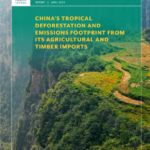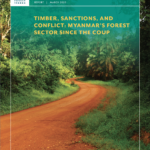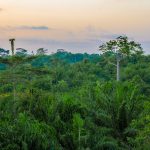The Forest Policy, Trade, and Finance (FPTF) initiative aims to promote policies which harness the power of market incentives for the legal, sustainable, and equitable trade in timber and other commodities harvested from forest landscapes.
Since its creation in the early 2000s, FPTF has gained the trust of high-level government decision-makers in key timber-producer and -consumer countries by providing timely data analysis with key insights on relevance for markets, livelihoods, and policy impact. Much of our research is developed in close collaboration with local civil society organizations, researchers, and other stakeholders.
Our Approach
FPTF combines research, mentorship, and convening “communities of practice” to address issues at the intersection of natural resource governance, markets and trade, law enforcement, transparent and accountable information systems, land and resource rights and shared benefits, and green growth.
1) Forest Governance and Legality
FPTF produces timely commodity chain analysis of timber and agricultural product market dynamics and trade flows, utilizing data from both primary (e.g., field research, customs agencies) and secondary sources, and focusing on trade flows that are at high risk of illegality. Engaging national stakeholders has proven essential in obtaining buy-in to our research results that can ultimately influence policy. Through this work, FPTF has been credited with helping open a dialogue with the Government of China on illegal logging, influencing the development of both FLEGT and REDD+ in Vietnam and Laos, and assisting governments, NGOs, and the private sector to understand risks in global timber supply chains.
2) Combatting Illegal Logging and Deforestation
FPTF has demonstrated the degree to which timber and agricultural commodities on global markets are sourced from illegally deforested land, a finding that now underpins key multilateral and bilateral strategies for addressing deforestation. The vast majority of corporate commitments to reducing deforestation have centered around a few commodities in a handful of countries, Indonesia and Brazil chief among them. While targeting these countries is critical, doing so misses regions such as Southeast Asia’s Mekong region and less-traded commodities, such as rubber, sugar, and rice. In the Mekong, we have used this work to bridge policy processes focused on legality, advocating for a combination of sound regulation and good governance as essential foundations for reforms in natural resource sectors.
3) Forest, Conflict, and Peacebuilding
Improved programs for forest governance can strengthen peace and security as much as they can improve environmental management and support local communities. To be effective, these programs must address challenges unique to countries attempting to recover from conflict. We aim to build the capacity of civil society, ethnic organizations, and government actors to ensure that peace processes create real, lasting sustainable development, while respecting local rights and reducing the likelihood of future conflict.
Key Results
- Following recommendations from our team and the Vietnam Chamber of Commerce and Industry, Vietnam’s Prime Minister directs ministries to develop procurement policies to ensure the government sources only legally harvested wood.
- The European Anti-Fraud Office opens an investigation after the release of our groundbreaking research detailing inconsistencies in enforcing European Union Timber Regulation between member states.
- Forest Trends signs an MOU with the Vietnam Sugar Association, part of our growing engagement with forest-risk commodities beyond timber. The Association approached our team to develop the MOU, encouraging proof that our model of engagement with industry trade (including for timber and rubber) is bearing fruit.
- Forest Trends outreach prompts an interagency team, including the US Department of State, to develop a joint message calling on Indonesia’s Ministry of Trade and Coordinating and Ministry of Economic Affairs to maintain timber legality verification rules for exports. Indonesia cancels the proposed regulatory rollback.
- Our briefing on the high likelihood of illegal timber entering Vietnam from Russia and Ukraine, often routed through China, results in Vietnam’s General Department of Customs tightening timber import controls from these countries.
- Trusted advisor to the UK government in the timber trade policy development process. Our data underpin the UK’s decision to focus on illegal deforestation.
- Almost 10 years supporting officials in the US, Europe, Asia, and Australia coordinate to enforce laws keeping illegal timber out of their markets. This work has expanded to include other high-risk commodities, such as soy, palm oil, beef, and leather.
- With our technical support, 7 Vietnamese timber associations sign a commitment to building a sustainable timber industry. All members commit to supporting legal timber supply chains, including a ban on importing high-risk timber for use in manufacturing. The initiative also mobilizes industry funding for protecting and replanting forests in Vietnam.
Key Resources
- Illegal Deforestation and Associated Trade (IDAT) Dashboard
- Forest-risk Commodities Dashboard
- Timber Regulation Enforcement Exchange (TREE)
FPTF has been working with government officials around the world since 2021 to further understanding of complex, high-risk supply chains for wood products and support coordinated implementation of various timber regulations: EU Timber Regulation, US Lacey Act, Australian Illegal Logging Prohibition Act, Canadian Wild Animal and Plant Protection, and Regulation of International and Interprovincial Trade Act (WAPPRIITA).
The TREE has since become an ongoing, biannual series of networking and information-sharing meetings. The TREE process aims to support robust, consistent enforcement of demand-side timber regulations by:
- providing a forum for officials to gain detailed insight into high- and low-risk timber flows entering their countries;
- discussing practical enforcement issues among peers and relevant experts;
- establishing new norms for Due Diligence and care related to different forest products; and
- building relationships with producer country governments, industry representatives, and other actors involved in combatting illegal logging and promoting global markets for legal timber.
REDDX Initiative (2009-2014)
The REDDX Initiative was created to provide information to help governments and other stakeholders 1) better understand the financial flows associated with REDD+ and 2) assess finance gaps and needs across national strategies. REDDX tracked REDD+ finance in 13 countries:
- REDD+ commitments and disbursements
- timelines between commitments and disbursements
- organizations receiving funds and implementing REDD+ activities (e.g., government, NGOs, consulting firms, community organizations)
- types of activities supported by financial commitments, such as improved forest and land management, carbon offsets, stakeholder engagement, etc.
Until 2015, over US$7.3 billion had been pledged to support REDD+ readiness through capacity building on the ground in tropical forest countries. Despite such high levels of financial commitments, information remained limited on how much of that money flowed to countries, which types of REDD+ activities were being supported, and which organizations were managing and implementing those activities.






